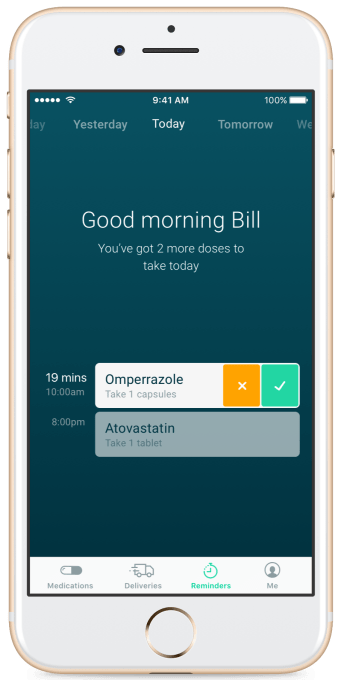
CREDIT: This story was first seen in TechCrunch
Echo, the U.K. startup that offers an app to help you manage your medication and order repeat prescriptions for delivery, has raised £7m in Series A funding, TechCrunch reports.
The round is led by White Star Capital, with participation from MMC Ventures, LocalGlobe, and Rocket Internet’s Global Founders Capital.
Notably, Public.io, the accelerator and investment vehicle founded by Alexander de Carvalho and ex-government advisor Daniel Korski to support startups transforming the public sector, has also invested. It brings total funding for Echo to £8.8 million and follows a £1.8 million seed round in 2016.
Founded by Sai Lakshmi, who previously worked in biz dev for Apple, and Stephen Bourke, who was previously a manager at Lloyds Pharmacy’s online doctor service, the Echo app for iOS and Android lets you order NHS prescriptions and get your medication delivered to your door. You simply tell the app the name of your GP and what repeat medication you take, which can be input using your phone’s camera and with the help of Echo’s NLP tech.
 From then on in, the app alerts you when you need to take your medicine and when you are running low. When a new prescription is required, under your instruction Echo will send the appropriate request to your doctor and nominate a pharmacy partner on your behalf. Once approved by your GP, your medicine is dispatched by 2nd class post and you pay the standard NHS charge if applicable.
From then on in, the app alerts you when you need to take your medicine and when you are running low. When a new prescription is required, under your instruction Echo will send the appropriate request to your doctor and nominate a pharmacy partner on your behalf. Once approved by your GP, your medicine is dispatched by 2nd class post and you pay the standard NHS charge if applicable.
All of this is enabled by the way echo has deeply integrated with the NHS Electronic Prescription Service (EPS), meaning that it works with existing GP NHS England practice systems and tech, and doesn’t require extra work on the GP surgery’s part. The idea is to make medication management, especially for people who have chronic conditions and take regular medicine, as hassle-free as possible.
From the in-depth demo of Echo I was given by Lakshmi and Bourke a few weeks ago it is also clear how much attention to detail has gone into the front-end of the app, resulting in a really good user experience and one that attempts to improve the quality of life of people on long-term medication.
Rather than think of Echo as simply bringing convenience in the Uber sense of the word for people who don’t like visiting the doctor or local pharmacy — which it does — the app also has the potential to remove stress and anxiety related to the possibility of running out of or forgetting to take your medication. Although it’s early days, Echo has been shown to improve adherence, too.
The latter is potentially quite a big deal; I’m told the NHS spends almost £18 billion a year on medication, but it is estimated that between a third and half of all medicines prescribed for long-term conditions are not taken as recommended. This has direct cost implications in terms of throwing away unused medication but also indirectly since a lack of adherence can lead to unnecessary hospital stays or other more expensive treatment.
In a call, White Star Capital’s Christian Hernandez, who joins Echo’s board, said that the U.K. startup was an attractive investment in a number of different ways. Thought of simply as an e-commerce play — which in many ways it is, taking a cut from partner pharmacies per order — the company’s offering has customer lifetime value baked in.
People on long term medication are going to be pretty sticky once signed up to the app, of which 50,000 have, and are Echo’s customers to lose. As long as the startup remains steadfastly focussed on customer service and can provide a superior experience to competing online pharmacies, he thinks the company can take a decent chunk of what is a large market.
In 2016, 1.1 billion prescription items were dispensed by the NHS within England, while there are said to be 15 million patients in England with a long term condition.
Beyond e-commerce, Hernandez sees other potential revenue streams, such as offering data to the pharmacy industry to help better manage the supply chain, but was keen to stress that Echo’s impact goes well beyond its commercial possibilities. Specifically, he talked up the benefits to patients’ health, the cost savings for the NHS in relation to medication waste and increased adherence, and for GP surgeries who can further reduce admin costs.
In other words, Echo could actually be an example of a Silicon Valley-styled startup that genuinely creates more value than it captures.
Don’t forget to follow us on Twitter, or connect with us on LinkedIn!

Be the first to comment